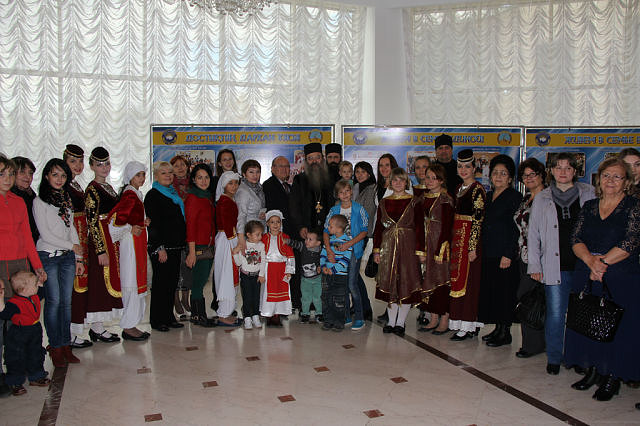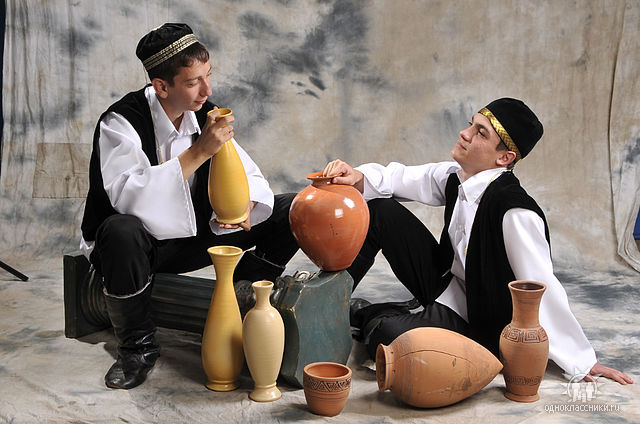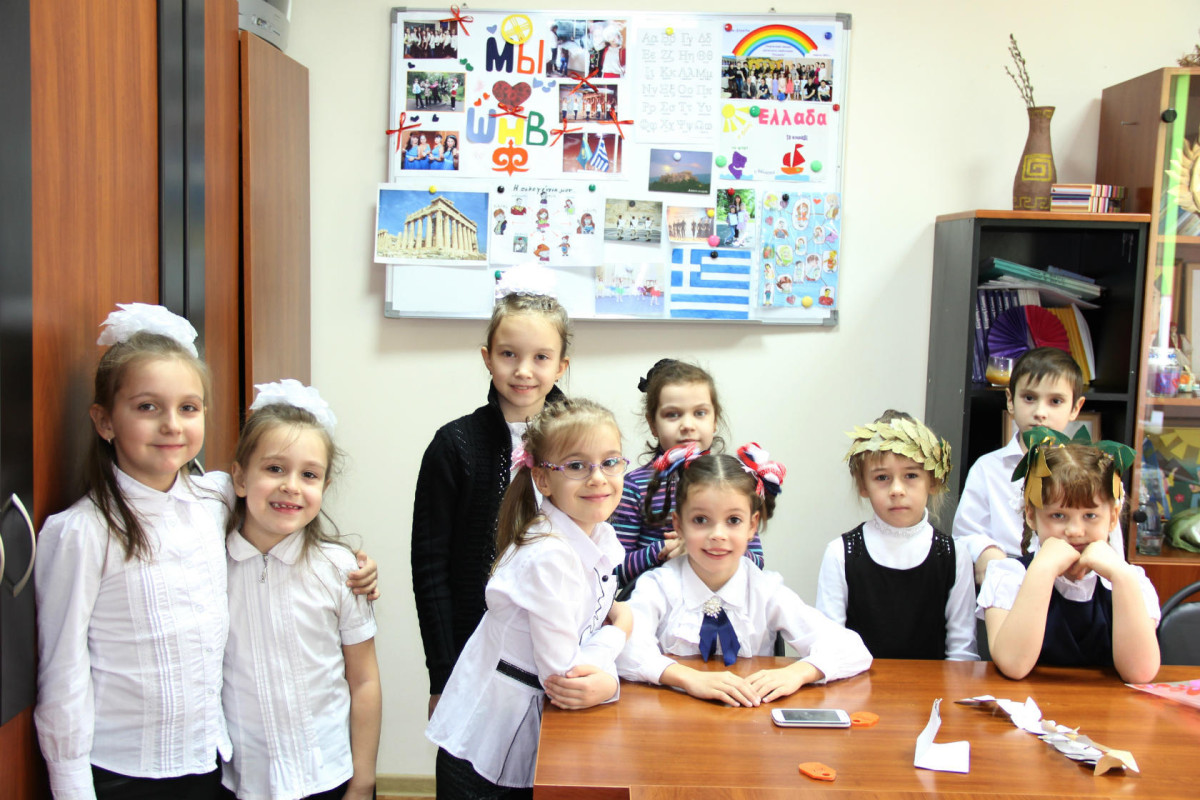Greek Ethno-cultural Association Elpida
Greek Ethno-cultural Association “Elpida” was founded in 1999. Its Head Lyudmila Ifandopulo told our edition that the centre unites more than 500 Greeks of Pavlodar. She also told about the history and creative teams of “Elpida”.
Pavlodar Regional Greek Ethno-cultural Association "Elpida" being a public organization was founded in 1999, organizes interesting and diverse activities. Today "Elpida" puts a new goal before itself: to preserve and grow the Greek culture in Pavlodar earth and to put the development of citizenship, patriotism, strive cultural heritage of the ancestors as an integral part of the richness of the Kazakh culture. Our doors are open to all who care about the culture of the Pontic Greeks and the development of Hellenism. We use the core group, the Elders’ Council, the youth wing "Σπαρτα" for it.
—Could you tell about yourself, how was the cultural centre formed?
—I am an initiator and Chairman since the formation of the Greek Ethno-cultural Association. Also I am a member of the Council of the Assembly of people of Kazakhstan, member of the Republican Association of Greeks of Kazakhstan "Filia".
Life in Greek "Elpida" is active. We use various forms of work: these are traditional summer days of Greek culture in the city recreation park, participation in various festivals and competitions (many victories have been achieved), and in scientific-practical seminars and trainings, creative trips to districts and villages. We hold meetings with students of educational institutions of the city, promoting the culture of the Greek people, its spiritual and moral values, as well as the ability to be tolerant, to live in peace and consent.
—Is there any historical information of Greeks in Pavlodar?
—Greeks in Kazakhstan, mainly appeared in the XX century. Although there is some evidence of an earlier stay of the Greeks on this land. Thus, the first Greek trace in Pavlodar region was left by the Moldavian Greek Christopher Bardanes, who was a surgeon, chemist and naturalist by profession. I.P. Falka traveled lands of vast steppes in Siberia and Kazakhstan (the beginning of 70-ies of the XVIII century) in his scientific expedition. There was another traveler after about a century in the same place. This time it was a merchant and a miner Alexander Benardaki. He was involved in searching for ore areas and deposits of coal. He made a historical claim for coal in our area. Greek colonists along with the Germans founded their estates and farms at the turn of XIX and XX centuries in the steppes of Kazakhstan along with the Germans. Rich Ukrainian Greek Miltiadi settled in the Irtysh parish of Pavlodar County in the area of Zhelezinka.
The mass settlement of the Greeks began in the XX century. The main part of the Greek diaspora in Pavlodar turned out to be victims of the Stalinist repressions of 30-40s. Also there was a small number of young professionals who came to the development of virgin lands in the 50s.
After the death of "Leader of the nations" the situation. A period of partial rehabilitation of the former prisoners of camps and the repressed started in the country. After 1956, there were events regarding the returnees. They were removed restrictions and given the opportunity to study, work, not to register in the special commandant’s office. Next years, many of the repatriates became Heroes of Socialist Labour, holders of many labour orders and medals, received the title of the honored.
The title of the honoured miner of the Kazakh SSR was nominated to K. Popandopulo (1923 – 2001), one of the first Pavlodar Greeks, who lived in Ekibastuz.
N. Dermenzhi – a noble miner, engineer of the locomotive, then the electric locomotive of Irtysh coal mine No. 1 of trust "Irtyshugol". He was awarded the order “Znak Pocheta” in 1957.
A significant part of the Greeks-villagers made meaningful work and was awarded orders and medals. In 1974 the order of the Red banner of Labour were awarded to: welder of Irtysh maintenance plant from Sedmoy Aul (Lenin village) M. Tetekli and in 1976, a tractor driver–machinist of the farm "Koskolsky", Irtysh district Pavel Arkhariadi.
The order "Badge of Honour" in 1980,1972, the order "Red banner of Labour", Gold medal of EEA USSR were awarded to branch head of the farm "Panfilovsky”, one of the founders of Greek ethno-cultural association "Elpida" K. Ifandopulo. The order "Badge of Honour" in 1980, was given to the truck driver of Panfilov collective farm, Irtysh district N. Ifandopulo.
Order of Labour Glory of the 3rd degree was awarded in 1975 to the tractor driver of the farm "Belovodsky" of Irtysh district V. Profatilo and in 1986 to the electrician of Krasnokutsky area communication centre P. Tetekli.
Greek men and women did not stay behind, medals "For labour valour" were awarded to Director of primary school No. 3 of Suvorov state farm E. Polikhranidi in 1966, head of stock trading base of Krasnokutsk district P. Kazanzhi in 1974 and the saleswoman of consumer society shop "Gigant" of Uspensky district E. Potipako.
The title "Honoured worker of agriculture of the Kazakh SSR" was awarded to the tractor driver of Issa Baizakov farm, Irtysh district I. Ustapanidi.
I would like to say about two Greeks who have contributed to the replenishment of the regional museum of local history. In the summer of 1958, the museum received a valuable unique find. It turned out to be a woman's wedding headdress with height of 40 cm made of silver leaf. The carpenter of the farm "25 let Oktyabrya" of Krasnokutsky district Konstantin Keldyuki gave this finding to the museum. According to a senior researcher of the Academy of Sciences of the USSR, professor S. Chernikov applies this finding to approximately XII - ХIV centuries. Now this find is exhibited in the museum, and it is a pity that there is no name of the person who passed this thing.
After 10 years, another resident of the rural area of the farm "Severny", Irtysh district tractor driver Savva Muratidi, paving a trench, pulled the mammoth tusk out of the ground, breaking off a piece of it. The employee of the museum of local history L. Gaiduchenko and photographer of the Museum L. Bagayev went to Severny. The tusk was brought to the museum and now it is inserted into the skull of a mammoth skeleton exhibited in the Nature Department of the museum.
Honoured builder of the Republic of Kazakhstan (1992), engineer, executive branch worker I. Kocheridi (1934 – 2008) made contribution in the history of construction of the region. He had government awards, also he was one of the first who was awarded the medal "For merits before region" in 2001. He was installed a memorial plaque on the building of trust, which he directed in Pavlodar in 2009.
V. Ifandopulo worked in Pavlodar airline enterprise as a flight engineer-instructor for 44 years ans was awarded the medal "Eren enbegi ushin" (2011).
Senior adviser of justice, Honourary employee of the Prosecutor's office of Kazakhstan E. Boznak worked in the Prosecutor's office of Pavlodar region in 1981-2012.
"Elpida" has one tradition, to remember those who have died over the years on the most important dates. We call it "Minute of lighted candles".
Youth wing "Σπαρτα" of Hellenic centre actively works in the Coordination Council of the Assembly. Lyudmila Aksyuzova and Yana Muratidi, Konstantin Grigoriadi, Georgy Muratidi, Anna Sarujidi were the leaders, currently “Sparta” is headed by Elizaveta Kolomiets. 19 years ago, when the centre was just formed, children came along with adults. The young people are still the basis of all creative teams of the centre and assistants in the important affairs of the Greek diaspora. Children pass social training, leadership school, receive political education in the Assembly of people of Kazakhstan. They learn to communicate with young people of different nationalities. They work together with the young people from other ethno-cultural centres, hold joint recitals, perform with joint concerts. We help young people in employment, in receiving grants to study in universities and colleges of our city.
—What could you tell us about creative teams at cultural centre?
—Dance group "Αγαπη" (2000-2007) is the first creative team formed in the Greek Association. Since 2007 this collective has been led by the choreographer Svetlana Dyachenko.
During creative activity "Agapi" became one of the best dance groups at the Assembly of people of Kazakhstan of Pavlodar region. Professional skills, multidirectional repertoire programme, good costumes made the team recognizable outside Kazakhstan.
At the invitation of the Ministry of culture of Kazakhstan "Agapi" repeatedly participated in the events on the largest stages (Palace of Peace and Accord, Congress hall, Ice Palace) of the capital of Kazakhstan – Astana.
The team was a participant of international festivals "Greek culture in Siberian Athens" in Tomsk (Russia) three times, bringing first degree diplomas for professionalism and folklore performance.
It is also a participant of Greek culture festivals held by the Republican Association of Greek communities of Kazakhstan "Filia". Now "Agapi" is the history of the centre, it was replaced by new creative teams.
Dance group " Αναγεννηση"
It was founded in 2007, its choreographer-S. Dyachenko. At first, the members of the team included young men, which allowed to diversify the repertoire. An example of it is a bright, incendiary dance "Zorbas", as well as male, traditional "SERA" – folk dance, the feature of the Greek dance art. The team has its own stage history, participation in festivals and events held in the region.
It took part in concert programmes in Astana, Shymkent, Temirtau, Taraz, Almaty, Kokshetau and cities of the Russian Federation – Tomsk and Omsk.
Vocal studio "Ορφεασ". Best performers of the vocal studio are Yulia Mehmanova and Konstantin Grigoriadi, Christina Kalaichidi.
Vocal group "Καρδιες απο τη μουσικη" (2014) is led by N. Shabuldaeva. The team has repeatedly won competitions of patriotic songs held by the Assembly of people of Kazakhstan, at the invitation of the Ministry of culture of Kazakhstan it took part in festive events in Astana. This collective is known on bright performances in areas of Pavlodar region, labour and educational collectives of the city.
Female vocal group "Μαργαριταρια" (2012) is led by A. Alekseyeva.
Children's collectives "Μικρα Αστερια" and "Πουλια" are led by Anastasia Bobrova. Collectives function at the Greek branch of the Dorzhumanb School of National Revival.
Children's groups "Μικρα Αστερια" - "Little stars" and "Πουλια" - "Chicks" are at the Greek branch of Dorzhuman school of national revival, the Greek branch is led by Anastasia Bobrova.
—Is there any Sunday schools at the centre?
—Yes, we have Dorzhuman school of National Revival. Teaching Greek for adults is conducted by Olga Ifandopulo. She studied in Greece in 2010-2011, University of Yanino).
—What kind of events are held at the centre?
—Various events are held at the cultural centre, for example: "Η οικογένεια είναι ο κόσμος" ("Family is the basis of the world"), active Greek families were invited for this event. The guests of this holiday were students of the pedagogical college. An interesting story about the families, traditions, labour contributions of the oldest, representation of adults and young activists of the diaspora were told. Guests were introduced to the traditions, foundations, young families of the diaspora were presented with myrtle trees as a symbol of family well-being. They were handed flowers, gifts, sang and danced. The main purpose of this event is to promote a strong family, with foundations, roots, tolerant and respectful attitude to each other and society as a whole.
The thematic programme "Memory of the Pontus" – "Mnimi tu Pondu" dedicated to the history of Greeks’ deportation. This theme is doubly symbolic for the Pontic Greeks, because May 19 is considered the Day of Remembrance of the Pontian Greek Genocide.
The genocide of 1916-1923 is the most tragic page in the history of the Pontic people; it is a pain that cannot be healed, a wound on the heart that never heals.
The purpose of the event is to convey to the modern generation that the memory of the genocide of the Greek people is necessary not only to the descendants and relatives of the victims, to know about such terrible events in the history of mankind is necessary for all. After all, forgetting the pain of the other, passing by indifferently, a man kills a bit of "humanity". We cannot allow such tragedies repeated again. The Frenchman Jean-Paul Sartre once said: "A man has a hole in his soul with the size of God, and everyone fills it as he can". Someone fills it with faith and fidelity to ideals, someone with irreconcilable fight against dissent, and someone with wisdom and humanity. Everyone chooses on his own. The events was finished with lighting of candles and a minute of silence in memory of the thousands of innocent victims.
"Megali erti sto Pavlodar"-"A great holiday in Pavlodar", dedicated to the 15th anniversary of the Greek Ethno-cultural Association "Elpida". This event is one of the brightest manifestations of the atmosphere of friendliness, harmony, tolerance between all ethnoses living in Kazakhstan, which our country is proud of. The festival which brought guests and creative teams of Greek communities together from different regions of our country, as well as Russia. (Tomsk).
Ambassador Extraordinary and Plenipotentiary of the Republic of Greece in the Republic of Kazakhstan Mr. Efthimios Pandzopoulos and Consul of the Embassy of the Republic of Greece in the Republic of Kazakhstan Mr. Emanuel Androulakis, as well as the President of the Association of Greek communities of Kazakhstan Pavel Feodoridi and the Chairmen of the Greek ethno-cultural associations from other regions of Kazakhstan took participation with great pleasure. Many warm good wishes were told from colleagues these days in honour of the anniversary.
“Duet of dombra and lyre” was held within the framework of the 15th anniversary of the Greek Ethno-cultural Association “Elpida”. The story of the musical instruments of the Kazakh and Greek people, the traditions of Kazakh and Greek singing, offer to listen to the musical works of the two nations. The guests enjoyed the music, the diversity of its sound, learned a lot from the culture of the two nations. Girls in national costumes treated the participants of the holiday with Kazakh baursaks and oranges and ice cream on Greeks’ tradition.
Use of materials for publication, commercial use, or distribution requires written or oral permission from the Board of Editors or the author. Hyperlink to Assembly of People of Kazakstan portal is necessary. All rights reserved by the Law RK “On author’s rights and related rights”. To request authorization email toank_portal@assembly.kz.
Dana TUGAMBEKOVA
 Subscribe to our Telegram channel and be the first to know the news!
Subscribe to our Telegram channel and be the first to know the news!



